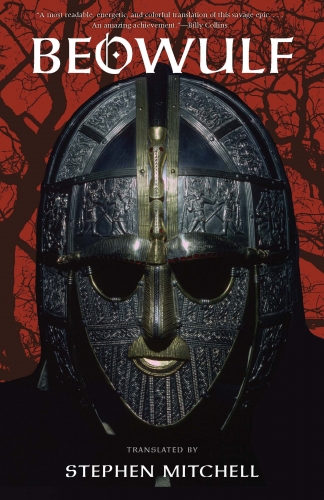Listen, there’s a poem, it speaks in the voice of England’s past like a flame beyond the language of the living. It’s more than a thousand years old and yet it still speaks to us. It’s called Beowulf.
–Michael Wood, Professor of Public History at the University of Manchester
Long before I learned how to read it in its original form, I understood that the Beowulf manuscript was the foundational text of my people: a sort of Nordic Summa Theologica, and a glimpse of what a northern Homer might have produced. It is an epic oral tale of a Swedish hero which, ironically, defines what it means to be English. It is also a quintessentially Anglo-Saxon work of Germanic origin, spoken by warriors with swords gripped firmly in their hands as they sailed up the east-coast estuaries. Their scops stood to recite the poem before war bands who had their minds set on forging a nation:
Yes, we have heard of the glory of the Spear-Danes’ kings in the old days
How the princes of that people did brave deeds.
Often Scyld Scefing took mead-benches away from enemy bands
From many tribes, terrified their nobles – after he was first found helpless.
He lived to find comfort for that
Became great under the skies
Prospered in honors until every one of those who lived about him
Across the whale-road, had to obey him, pay him tribute
That was a good king
Those dry vellum pages of the Beowulf manuscript – which only narrowly survived a devastating fire in Ashburnham House in 1731 – have provided a scintillating word-hoard that has dramatically impacted our indigenous British culture, society, and language. Of this, Merton Professor of Anglo-Saxon J. R. R. Tolkien once wrote, in “Beowulf: The Monsters and the Critics”:
The significance of a myth is not easily to be pinned on paper by analytical reasoning. It is at its best when it is presented by a poet who feels rather than makes explicit what his theme portends – who presents it incarnate in the world of history and geography, as our poet has done.
These expressions are as familiar to us today as the shadows we cast when we stroll our village lanes around Rendlesham in Suffolk, the home to the Wuffinga royal line. They are our ancestral stories, such as the Battle of Brunanburh in 937, perfectly encapsulating the notion of the arrival myth:
Since the Angles and the Saxons
Came up over the broad waves

It is literally our nation’s most precious relic, relating events of war, vengeance, and battling monsters in late fifth-century Scandinavia. Nevertheless, both its author and the location of its final composition are unknown. Scholars have speculated that it has East Anglian pagan roots, linking it to King Raedwald and Sutton Hoo. Others guess that its Christian overlay was added many centuries later, when it was copied into the Late West Saxon dialect in the scriptorium at Malmesbury.
The work’s descriptions of Anglo-Saxon material culture – ships, rich burials, inscribed swords, elaborately-decorated royal halls – and our ancient customs still resonate today:
Hrothgar presented Beowulf with a gold standard as a victory gift
An embroidered banner, also a breast plate
And a helmet and a sword carried high,
That was both precious object and a token of honor
Kingship was revered in those days, and the people’s trust and tribal loyalty had to be earned. This is symbolized in the poem by the Danish King Hrothgar’s establishment of Heorot:
Now it came into his mind
That he would command the construction of a huge mead hall
A home greater than Middle-earth had ever heard of
And share the gifts god had bestowed upon him with young and old,
There was music of the harp and sweet minstrels singing
Perfect in telling of the remote first making of the race of man
One way for a war-leader to earn such recognition was through acts of valor, an opportunity afforded to Beowulf when Heorot is assailed by a fen-dwelling creature called Grendel:
Gliding through the shadows the walker in the night,
The warriors slept all but one and this man kept an unblinking watch
Waiting pent heart swelling with anger against his foe,
And from off the misty moorlands eerie fells came Grendel stalking
He moved through the dark and saw with perfect clearness the gold plated hall
The mead drinking place of men
The door gave way at the touch of his hands
Raging flames wreckage bent he tore the hall’s jaws
Angrily advancing, from his eyes shot a light,
Before the wall he saw a host of young warriors
And in his heart he exulted, the horrid monster
All his hopes swelling for a glutinous meal,
As a first step he set his greedy hands on a sleeping soldier
He tore him and gnashed at his bone joints bolted huge gobbets
Sucked at his veins and soon had eaten the man down to his fingers and feet,
Then he moved forward to seize our warrior Beowulf,
Stretched out for him with his spite filled fist
But the faster man forestalling rose up on his arm and gripped that sickening hand,
Hateful to each was the breath of the other,
Gripping the giant shoulder frame
Shoulder muscles praised apart
A snapping of tendons, bone-locks burst,
The arm of the demon was severed from his side
And Grendel flew death-sick to his joyless den
Where he knew the end of his life was in sight,
Beowulf had cleansed Heorot
Saved the hall from persecution
And as a signal to all, the hero hung the hand, the arm torn off shoulder
The entire limb, Grendel’s whole grip beneath the soaring roof!
He then follows this up by killing Grendel’s malice-filled mother as well:
Then he saw among the armor on the wall
A great sword from former days,
This wonder was so enormous that no other man
would be equal to bear it in battle play,
The Geat champion shaking now with war rage
Caught it by the rich hilt and careless of his life
Brandished it in circles and brought it down
And thrust it into the neck,
The blade sheared through to the backbone
The sword was gory, he was glad at the deed
Beowulf’s actions bring him fame and glory amongst his own people. This set an example for the Anglo-Saxons, whose own royal houses claimed direct descent from the Danes, Geats, and Swedes such as King Hygelac, who the poem mentions as being one of Beowulf’s relatives, and who we know from other sources lived at the time the oral story is believed to have first been told.
Men and women would have listened intently to the beautifully lyrical evocation of their imagined past as they sat transfixed next to crackling hearth-fires. They would have felt the terror and excitement of their hero’s daring adventures, all the while learning what leadership and manhood really meant through the myth-making fable. The war captain and Bear-Warrior rallies his kinfolk and secures them from external threats, defending his realm in the face of mysterious beasts, which are really cyphers for much deeper psychological fears such as societal fracture, the breakdown of tradition, and the instinctive dread of the unknown other. The poem likewise explores themes of passing time, loss, and the inherent glamor and dangers of masculine societies.

The manuscript, which is the longest extant poem written in Old English, is kept in the Cotton Vitellius archive. It had first resurfaced during the Elizabethan period in the collections of antiquaries, and was translated into modern English by John Richard Kemble in 1837. Although it was always recognized as a classic of English literature, many scholars at first thought it to be too digressive and confusing. Itwas eventually championed during the Victorian era, when the vogue for all things Anglo-Saxon was at its zenith, due in part to the ethos of the British Empire’s administration attempting to rationalize their success at colonizing most of the known world by explaining their own uniqueness, both to themselves and their subjects.
The poem frequently references German legends that would have been known to its audience, but which are lost to us today. Exceptions are the allusions to Heremod, Finn, Offa, and Eormenric, and a poet at Hrothgar’s court praising Beowulf following his defeat of Grendel and his mother by comparing him to Sigemund. The story opening with reminiscences of Scyld Scefing, the father of Danish and English kings, and explaining how he “was a good King.” This is the key philosophical point underlying the whole poem: It is an exploration of kingship, condemning bad rulers who oppress their people by putting their own interests first while praising those who are generous and prudent, and who take the time to make considered judgments. It is a cogent thesis on power and how it is used in different ways – physical strength, mental determination, and political acumen – and recognizes how each can be used to either good or bad effect, as well as how power and influence grows and withers with time. It likewise acknowledges that despite the fact Beowulf has the strength of thirty men, nature, the seasons, and death will inevitably overcome such transient successes – and power, like the sea, will inevitably overwhelm a low sandy coastline.
This creates a poignancy that is even more effective when one considers that although the final written version is aimed at the sensibilities of a rapidly Christianizing community, and that it speaks of an all-powerful singular God – “God, the guardian of glory, may ever work wonder after wonder” – it was a God whose East Anglian, Northumbrian, and West Saxon armies, made up of recent converts to Christ, were thwarted by the pagan Penda in a number of bitter engagements in the mid-seventh century. Penda’s victorious Mercian men seized a bishop’s headdress, a portable shrine or reliquary, a golden garnet-encrusted cross, helmets, over one hundred fifty swords, and seax fighting knives. One piece bears the very telling inscription: “Rise up, LORD, and let thy enemies be scattered; and let them hate thee before they flee.” This indicates that it was used as a battle talisman during the internecine fighting between the rival early Anglo-Saxon kingdoms. All of these were disfigured as war-booty and buried as offerings to Penda’s ancient gods, only to be discovered in Lichfield fourteen hundred years later as part of what has now become known as the Staffordshire Hoard.
This was find so emblematic of our nation’s birth that it has breathed fresh life into the study of a period that has lain dormant for far too long; a six-hundred-year epoch that solidified an identity that still stands strong. It reiterates the importance of a poem in which Beowulf dies, and is commemorated by pre-Christian rites. His afterlife is forever dependent upon his memory being upheld by the traditions of his people:
A boat with a ringed neck rode in the haven
And there laid out their Lord and Master, the giver of gold
In the waist of the ship in majesty below the mast,
A mound of vast treasures from far countries was fetched aboard her
And it is said that no boat was ever more bravely fitted out
With the weapons of a warrior
Military accoutrement, swords and body armor,
High overhead they hoisted and fixed a gold signum
Gave him to the flood and let the seas take him . . .
This is why it is so important for our children to peer into the tunnel entrance of Wayland’s Smithy in Oxfordshire and to walk the footpaths between the great mounds at Sutton Hoo. Therein lies a lesson for us all, for the perpetuation of our folk-memory in poems, chants, and incantations is as important as the preservation of the blood of our race:
Then the people of the Weather-Geats built a mound on the promonotory
one that was high and broad, wide-seen by sea-farers
and in ten days completed a monument for the bold in battle
surrounded the remains of the fire with a wall
the most splendid that men most skilled might devise.
In the barrow they placed rings and jewels
All such ornaments as troubled men had taken from the hoard.
They let the earth hold the wealth of earls, gold in the ground
Where now it still dwells, as useless to men as it was before.
Then the brave in battle rode round the mound
Children of nobles, twelve in all
Would bewail their sorrow and mourn their king
Recite dirges and speak of the man.
They praised his great deeds and his acts of courage
Judged well of his prowess.
So it is fitting that man honor his liege lord
Love him in heart when he must be led forth from the body.
Thus the people of the Geats, his hearth-companions
Lamented the death of their lord.
They said that he was of world-kings the mildest of men
And the gentles, kindest to his people
And most eager for fame.





 del.icio.us
del.icio.us
 Digg
Digg
Les commentaires sont fermés.